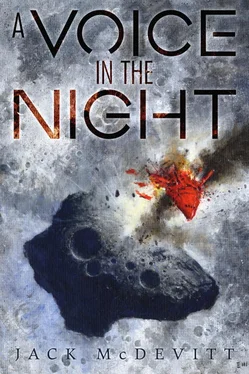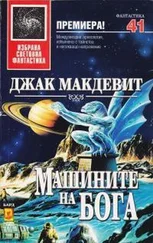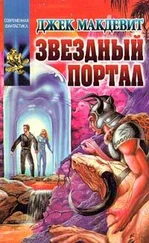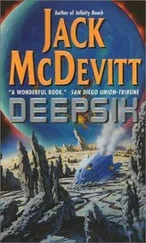On the evening of the incident in the tree belt, which was the first unplanned occurrence in Arnold’s life since he’d fallen out of a canoe in ’08, he returned to the store in a state of considerable disarray. He locked both downstairs doors and checked all the windows, a routine he didn’t always follow in crime-free Fort Moxie. And he retreated upstairs to the back room, where he sat a long time beside the telescope, watching darkness approach across the distant tree line.
He never doubted that he had in fact heard his name out there. Arnold was far too solid, too stable, to question his senses. He did not believe it was a prank, did not see how a prank could have been executed.
But what, then, was it? In the good hard light of his room, he could dismiss the supernatural. But what remained? Was it possible that some trick of the wind, some unlikely chance pattern of branches and air currents and temperatures had produced a sound so close to “Arnold” that his mind had filled in the rest?
For almost an hour, he sat with his chin propped against his hands, staring through the window at the distant treetops.
Later, he went out to dinner, down to Clint’s. That was a treat, but tonight he felt entitled. He wanted people around him.
The usual routine was that Arnold opened up at nine. He had two part-time employees: Janet Hasting, a housewife who relieved him at lunchtime; and Dean Walloughby, a teenager who came in at three. If things were quiet, Arnold worked on his inventory, or his taxes, and made the trip to the bank. They closed at five. Dean went home, and Arnold went jogging.
But today, the day after the incident Arnold had begun to think of as The Encounter , complete with capitals, he had a decision to make. He enjoyed running. He especially enjoyed the solitude of the tree belt, and running against the wind off the prairie. He liked the clean rock-and-water smell of the Red River, and the far-off sound of airhorns on I-29. It was just after Labor Day, and Fort Moxie’s short summer was fading fast. He did not like to lose what little good weather was left, especially to an aberration, a trick of the senses.
Arnold had been unnerved by the experience. He trembled at the prospect of going there again, understood he could keep away and no one would ever know he had given in to his fear. He might wonder for a time what had actually happened, but he knew that eventually he would assign the event to an active imagination.
That seemed like the safer course.
Yes. He would stay clear. No point tempting fate. Why ask for trouble? This afternoon, he would confine himself to running in town. Getting near the end of the season anyway. And having made his decision, he welcomed Janet Hasting in at eleven, and went to lunch shortly after with a clear conscience.
Arnold said hello to the small crowd of regulars in Clint’s, and drew up a chair beside Floyd Rickett, who was dismembering a BLT. Floyd was tall, gray, sharp-nosed, pinched-looking, well-pressed in his postal uniform. He harbored strong opinions, and an unflappable sense of the importance of his own time. Cut to the bottom line, he was fond of saying, jabbing with the three middle fingers of his right hand. Floyd did a great deal of jabbing: He jabbed his way into conversations, jabbed through political opposition down at the club (where he was recording secretary), jabbed through lines and crowds. Life is short. No time to waste. Cut to the bottom line. At the post office, he specialized in sorting out problems caused by the general public. Floyd tolerated no sloppy wrapping, no barely-legible handwriting, no failure to add the proper zip code.
“You look upset,” he said, targeting Arnold.
Arnold sat down and shook his head. “I’m fine.”
“I don’t think so.” Jab. “Your color’s not good.” Jab. “And you’re avoiding eye contact.” Slice.
Arnold immediately tried to look directly into his eyes. But it was too late. “Something odd happened to me yesterday.”
Bottom line. “What?” Floyd leaned forward with interest. Odd occurrences, especially of the sort that could drain the equanimity from as solid a citizen as Arnold Whitaker, were rare in Fort Moxie.
“I don’t know how to explain this, exactly.” Arnold looked up as Aggie came over to take his order. When she had gone, he repeated his observation.
“Just get to the point,” said Floyd.
“I was jogging in the wind screen yesterday. I go up there every day, after I close up.”
Floyd shifted his weight.
“I heard a voice,” Arnold said.
Floyd took another bite out of his BLT, chewed, and frowned when nothing more was forthcoming. “I give up,” he said at last. “Who was it?”
“There wasn’t anyone there.”
“Must have been somebody. There was somebody behind a tree.”
“No.”
“Then what’s the point?”
“It wasn’t a voice like yours or mine. What I mean is, that it wasn’t a person’s voice at all.”
Floyd frowned. “What other kinds of voices are there?”
“I don’t know.”
“Okay. What did it say?”
“Nothing.”
“Nothing?”
“Just my name.”
“And that’s it?”
“Yes.”
Floyd tilted his head, smiled, and finished his iced tea. “Got to go,” he said. He had recognized that this was a conversation without a bottom line. No need to waste time on it. “Listen, Arnold, what you heard was an echo. Or the wind. Wind plays funny tricks sometimes.” He patted his lips with his napkin. “Maybe you need to take a few days off.”
Arnold went back to the store, and reconsidered his decision to stay away from the wind screen. He could not allow himself to be frightened off from something he really enjoyed doing. Especially when he had no explanation to offer, even to himself. By two o’clock, he had decided to confront whatever might be lurking (and that was the word that kept coming to mind) in the trees. And damn the consequences. But over the next hour, the forces of caution stormed back and retook the hill.
He considered inviting Dean, his part-timer, to go with him. But how would he explain the request? And anyway the kid was in terrible shape, and would only slow him down if a quick exit became necessary.
By the end of the business day, he had changed his mind several times, and finally settled on a compromise: He would stay out of the trees, but he would run as close to them as he could, while remaining on the streets.
His usual regimen, after locking up and changing into his sweat suit, was to drive down and park at the Historical Center, then run back along Bannister Avenue through town, and connect with the jogging path on the west side. Then he would follow it around the northern perimeter of Fort Moxie, passing the site of The Encounter , and eventually come out at the Historical Center. The route was about five miles long. He never actually ran that distance, couldn’t run that far, but he used a combination of jogging and walking. And sometimes he stopped altogether. Frequently did so, in fact. All in all, he might need anywhere from an hour and a quarter to two hours to complete the course.
Today would be different. He left his car in the garage and started out along Bannister, cruising past the post office and the bank and the Prairie Schooner Bar and Mike’s Supermarket and the Intown Video Store. But, instead of continuing all the way out to the western side, he turned north at Fifth Street, cutting across the leaf-strewn grounds of the Thomas Jefferson Elementary School.
Directly ahead, about six blocks, he could see the line of elms and boxwoods. The treetops rolled in a brisk prairie wind. They looked harmless enough. They also looked deep: when he’d been a boy, Arnold’s imagination had delighted in turning the narrow belt of trees into thick woods. That childhood Fort Moxie had been a redoubt carved out of a vast forest, rather than a lonely outpost on the prairie.
Читать дальше










